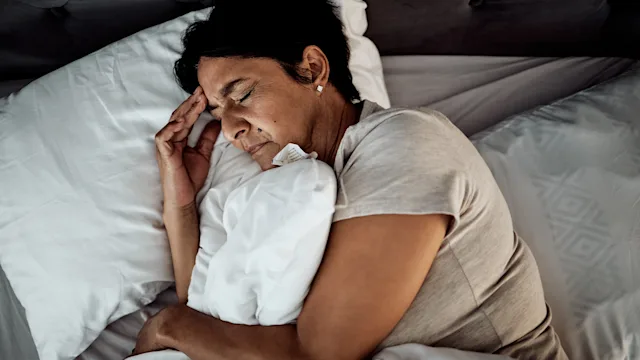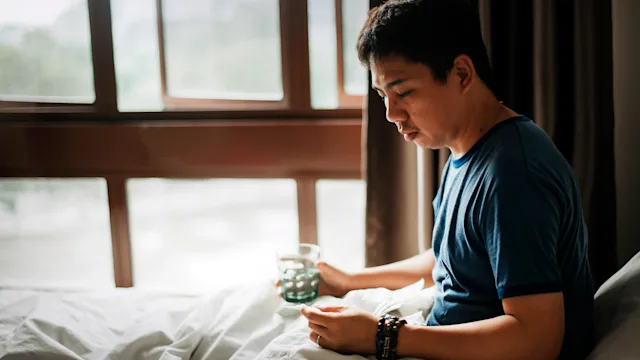Key takeaways:
Insomnia can make it hard to fall asleep — even when you feel tired — and may require medical treatment.
Stress, poor sleep habits, and other medical conditions can also make it challenging to get to bed.
Try creating a relaxing bedtime routine if you're tired but can't sleep. If it doesn't help after a few weeks, talk to your primary care provider about your sleep difficulties.
When you're tired at the end of the day, all you want is to crawl into bed and drift off to the perfect night's sleep. It might feel like cruel and unusual punishment if you find yourself lying there, exhausted but unable to sleep.
Many people experience the occasional night when they feel tired but can't sleep. But if you regularly have trouble falling asleep, staying asleep, or both, what you're experiencing is insomnia. And that's different from simply feeling overtired.
Learn more about why you might feel tired but can't sleep, plus get tips for what to do about it.
Quiz: Do I have insomnia?
What is insomnia?
Acute insomnia refers to short-term difficulty falling or staying asleep for several nights a week. Chronic insomnia occurs when you have these sleep difficulties for three or more nights per week for at least three months. Both forms of the common sleep disorder can leave you fatigued when you wake up, making it hard to drag yourself out of bed.
Insomnia is different from being overtired. Overtiredness doesn't have a formal medical definition. But it generally refers to excessive sleepiness, often due to inadequate sleep. When you're overtired, you may not have trouble falling or staying asleep, as with insomnia. Instead, you might not spend enough time in bed getting the rest you need. This creates sleep debt, which is the difference between how much sleep you need and how much sleep you actually get.
Why are you tired but can’t sleep?
From insomnia to overtiredness, there are many reasons you might feel tired but can't sleep.
1. Poor sleep habits
If you find that you can't sleep, even when you're tired, it's time to review your nighttime routine. Poor sleep habits, like these, can make it harder for your body and brain to power down before bed:
Keeping an irregular sleep schedule: Going to bed and waking up at different times every day can disrupt your sleep-wake cycle.
Using electronics before bed: Blue light from phones, laptops, and other screens has been shown to block melatonin, a hormone that regulates sleep.
Napping too long or late during the day: Your daytime habits also affect how well you sleep at night. Taking a long or late afternoon nap might leave you less tired at bedtime.
Eating too close to bedtime: Heavy meals or late-night snacks might cause indigestion or discomfort, making it tough to catch some z's.
Having caffeine, alcohol, or nicotine late in the day: Caffeine and nicotine are stimulants that make it hard to wind down at night. Alcohol is a depressant that can interfere with your sleep cycle.
2. Stress and anxiety
Racing thoughts and worries at bedtime can make it harder to doze off at night. In fact, stress and anxiety have been linked to an increased risk of insomnia. Plus, when you're tired but can't sleep, it's natural to keep checking the clock. But that only heightens your worry about getting enough rest. And difficulty sleeping can worsen stress and anxiety, creating a cycle that's hard to break.
Can't sleep? People who used to have trouble sleeping share ways to improve your bedtime routine.
Medication can help with insomnia. Experts weigh in on the best sleep medications for insomnia.
Keep waking up in the middle of the night? Consider these tips to fall back asleep fast.
3. Sleep disorders
Insomnia affects up to 40% of adults in the U.S. every year. It's one of several sleep disorders that can also make it hard to fall or stay asleep, even when you're tired. For example, restless leg syndrome causes uncomfortable sensations in the legs and an urge to move them. With sleep apnea, breathing stops for short periods while sleeping.
4. Mental health conditions
Mental health conditions can make it hard to get restful sleep even when you're tired. These conditions shouldn't be confused with general stress or anxiety. They may change how your brain functions and processes emotions, causing symptoms that disrupt your sleep. Examples include:
Depression: Depression is a common mood disorder that’s been linked to insomnia, waking up too early, and excessive sleeping.
Anxiety disorders: Anxiety disorders can be linked to excessive worry and racing thoughts, which can disrupt sleep.
Bipolar disorder: Manic or depressive phases of bipolar disorder can result in sleeping less or sleeping excessively.
Attention-deficit hyperactivity disorder (ADHD): Restlessness and other ADHD symptoms can interfere with nighttime sleep.
Post-traumatic stress disorder (PTSD): PTSD symptoms, such as hypervigilance and nightmares, can lead to sleep problems.
5. Chronic pain conditions
Living with chronic pain can also make it hard to sleep, especially while lying down with fewer distractions to take your mind off the pain. Conditions like osteoarthritis, migraines, and fibromyalgia could be the reason you have trouble getting restful sleep. Many people with fibromyalgia, for example, find it hard to fall or stay asleep. They may also feel fatigued or exhausted during the day, even when they do get enough sleep.
6. Medications
Certain medications can make it difficult to sleep, even if you're tired. Examples include:
Decongestants
Antidepressants
Stimulants
You shouldn't stop taking prescription medications just because you think they might be affecting your sleep, though. Talk to your primary care provider about treatments or strategies to get better sleep.
Tips to help you sleep better
Some of the reasons you're tired but can't sleep are out of your control, such as having mental health conditions. So, it's important to take steps to control the factors you can.
To make sure you're practicing healthy sleep hygiene, try these tips:
Create a comfortable sleep environment. Your bedroom should be cool, dark, and quiet. Be sure to power down electronic devices that emit light and keep your brain alert.
Establish a bedtime routine. Go to bed and wake up at the same time every day, even on weekends, if you can.
Practice relaxation techniques. Meditating, taking a bath, and journaling before bed may all help you drift off.
Limit substances that disrupt sleep. Caffeine, alcohol, and nicotine are no-no’s before bed. Try to avoid them 4 to 6 hours before bedtime. You'll also want to stop consuming all liquids a couple of hours before bedtime.
Get active. Regular exercise may help you get better, more restful sleep. Just be sure to avoid vigorous workouts at least 90 minutes before you go to sleep. Instead, try deep breathing exercises or gentle yoga poses to help you relax.
When to see a healthcare professional
There are several ways to manage sleep problems at home. But you should see a healthcare professional if symptoms –– such as trouble falling asleep or excessive daytime fatigue –– last longer than a few weeks. You should also make an appointment with a healthcare professional if you suspect that these issues are related to an underlying condition.
Frequently asked questions
Maintaining healthy habits throughout the day can help you stay energized. Try to:
Eat a balanced diet with whole foods.
Take regular breaks.
Move your body.
Plan social activities after work when possible.
A relaxing bedtime routine can also help you get the rest you need to feel refreshed throughout the day.
There are several reasons why you keep waking up at night, including:
Poor sleep hygiene
Sleep disorders, such as insomnia or sleep apnea
Hormonal changes, such as during pregnancy or perimenopause
Medical conditions that cause chronic pain
Try the following tips to make waking easier:
Stick to a consistent sleep schedule.
Get some bright, natural light first thing in the morning.
Try not to hit the snooze button or grab your phone right away.
Do some gentle movements, like walking or yoga, to rev up your energy.
Eat a nutritious breakfast to power your day.
Maintaining healthy habits throughout the day can help you stay energized. Try to:
Eat a balanced diet with whole foods.
Take regular breaks.
Move your body.
Plan social activities after work when possible.
A relaxing bedtime routine can also help you get the rest you need to feel refreshed throughout the day.
There are several reasons why you keep waking up at night, including:
Poor sleep hygiene
Sleep disorders, such as insomnia or sleep apnea
Hormonal changes, such as during pregnancy or perimenopause
Medical conditions that cause chronic pain
Try the following tips to make waking easier:
Stick to a consistent sleep schedule.
Get some bright, natural light first thing in the morning.
Try not to hit the snooze button or grab your phone right away.
Do some gentle movements, like walking or yoga, to rev up your energy.
Eat a nutritious breakfast to power your day.
The bottom line
Stress or insomnia can leave you feeling tired but unable to sleep. Chronic pain or other underlying health conditions could also be to blame. These conditions may require guidance and treatment from a healthcare professional to get better rest. But, sometimes, simple changes to your sleep hygiene can help. Try sticking to a relaxing nighttime routine, avoiding caffeine and alcohol before bed, and keeping screens out of your bedroom.

Why trust our experts?



References
American Academy of Sleep Medicine. (2020). Insomnia.
American Heart Association. (2023). How to establish a wake-up routine for a good morning every morning.
Centers for Disease Control and Prevention. (2024). Symptoms of ADHD.
Dopheide, J. A. (2020). Insomnia overview: Epidemiology, pathophysiology, diagnosis and monitoring, and nonpharmacologic therapy. American Journal of Managed Care.
Drake, C., et al. (2013). Caffeine effects on sleep taken 0, 3, or 6 hours before going to bed. Journal of Clinical Sleep Medicine.
Harvey, A. G., et al. (2009). Sleep disturbance in bipolar disorder across the lifespan. Clinical Psychology.
He, M., et al. (2024). Insomnia and stress: The mediating roles of frontoparietal network. Brain Imaging and Behavior.
Lockley, S. W., et al. (2003). High sensitivity of the human circadian melatonin rhythm to resetting by short wavelength light get access arrow. The Journal of Clinical Endocrinology & Metabolism.
MedlinePlus. (2024). Sleep disorders.
National Institute of Neurological Disorders and Stroke. (n.d.). Restless legs syndrome.
National Institute on Aging. (2020). A good night’s sleep.
Nutt, D., et al. (2008). Sleep disorders as core symptoms of depression. Dialogues in Clinical Neuroscience.
Park, A., et al. (2021). Exercise improves the quality of slow-wave sleep by increasing slow-wave stability. Scientific Reports.
Parmelee, P. A., et al. (2015). Sleep disturbance in osteoarthritis: Linkages with pain, disability, and depressive symptoms. Arthritis Care & Research.
Phillips, A. J. K., et al. (2017). Irregular sleep/wake patterns are associated with poorer academic performance and delayed circadian and sleep/wake timing. Scientific Reports.
Singh, N., et al. (2023). Effects of nicotine on the central nervous system and sleep quality in relation to other stimulants: A narrative review. Cureus.
Waliszewska-Prosół, M., et al. (2021). Migraine and sleep—an unexplained association? International Journal of Molecular Sciences.
Winokur, A., et al. (2015). The relationship between sleep disturbances and psychiatric disorders: Introduction and overview. Psychiatric Clinics of North America.














